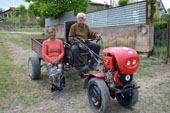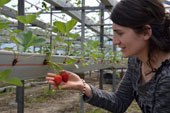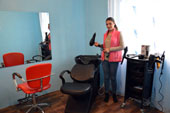
CiDA’s Eco migrant beneficiaries run small businesses in remote villages of Kakheti
By Etuna Tsotniashvili
Tuesday, May 2
The Civil Development Agency (CiDA) has been implementing a project that aims to improve the economic conditions of eco-migrants living in the Kvemo Kartli, Kakheti and Samtskhe -Javakheti regions of Georgia.
The project, “Raising the Economical and Infrastructural Capabilities of Eco-Migrants in Managing the Migration Process”, is funded by the European Union and unites the following three components: 1. Supporting female eco-migrants in small business start-ups 2. Rehabilitating infrastructure 3. Advocacy services.
The project is due to finish, but small businesses are starting to boost incomes for eco migrant families.
Natela Dumbadze, from the village of Samtatskaro, is one of the women whose prior wish was to have a tractor, as her whole family faced real hardship working in the fields with their own hands. Now, because of new techniques learned through the project, vegetable gardens have significantly increased and they are now expecting harvests of potatoes, cabbages, and onions. As well as servicing their own gardens, the owners rent the tractors out to neighbors in need and they receive an additional income of GEL 400 per month.
Overall, within the project, CiDA bought four tractors in the Samtatskaro village, which is located right across the Azerbaijani border line.
25 year-old Tatia Geladze, from Heretiskari village, begun a strawberry producing business. CiDA arranged to build a greenhouse with strawberry plants, as a result of which her family planted hundreds of plants and they are just starting gathering the fruits. Tatia is not afraid of the scope of the venture, as demand is high locally as well as among private traders.
“I have been always thinking that I should return to Adjara, where my family comes from. When I see the project result and my contribution to it, I hardly imagine to leave it and go somewhere else. For the first time, I am sure that I will be living here for a long time and try my best to become a successful entrepreneur.”
Lali Gejadze has a touching story. During the grant application process her mother-in-law won a grant to open a beauty salon in Heretiskari as she was not in the country at that time, as she had left the family and went to Turkey to work there and send money back. After the grant was approved, she came back to her village and took courses to learn all the skills necessary to work in a beauty salon.
The salon is now open and she welcomed her first clients in early March, and the salon will actively continue working after her courses are finished in two months.
“I missed my family, especially my two year old boy whom I left because of the bad economic situation. When I first heard that I would have my own salon where I would work and serve local people, I felt terribly happy. I want to learn everything in a short period of time to run my small business successfully. What is most important is that I am back at home,” she says.
Overall, about 30 business ideas were financed in the villages of Kakheti populated by eco-migrants from Adjara, who have been living there since 1989.
The project, “Raising the Economical and Infrastructural Capabilities of Eco-Migrants in Managing the Migration Process”, is funded by the European Union and is implemented by the Civil Development Agency (CiDA), the Regional Development Center (RDC) and the Georgian Association for Educational Initiatives (SIQA).



